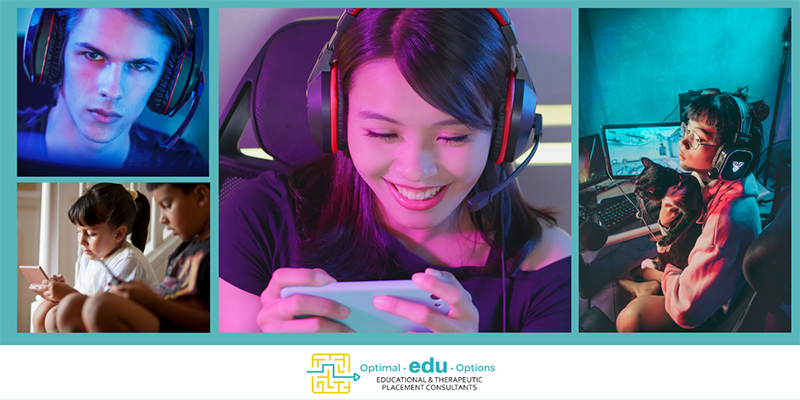How much screen time is too much for my child? It’s a question our team at Optimal Edu Options often hears from parents. Unfortunately, the answer is complex because a finite amount of time doesn’t necessarily prevent predators from finding your child during their allotted time or prevent them from seeing material that they aren’t mature enough to visit during their daily time online.
As noted in an article by Common Sense Research, all screen time is not created equally. The nonprofit evaluates the impact of media and technology on children and offers reviews, research, and ratings. The agency identifies four main categories of screen time:
- Passive consumption: watching videos or shows, reading, and listening to music
- Interactive consumption: playing games and browsing the internet
- Communication: video-chatting and using social media
- Content creation: making digital art or music
Passive consumption is the area for most concern because there is little return on the time investment. Using computers for study groups, researching a school project, or writing music or making graphics – all involve time with a reward for the efforts. We will focus here on the negative repercussions of passive screen time.
With more and more technology in the classroom, and the pandemic pushing more activities online, children are spending vastly more time using computers, tablets, phones, and online gaming systems.
Gail Curran, owner of Optimal Edu Options and an expert in helping families find the best educational and therapeutic options for their children, emphasizes that too much passive online screen time can be detrimental to a child’s health. For example, a teen who stays up too late playing video games or social media may struggle in school because they are too tired to get up in the morning.
Another issue is that many children have televisions, phones, iPads, and gaming systems in their bedrooms, where they retreat to avoid the rest of the family. Parents may not realize just how much time the youth is online.
“These are all red flags that parents need to be aware of,” Curran said. “Too much time online isn’t healthy, either mentally or physically, for our children.”
The American Academy of Pediatrics notes that all children need 8-12 hours of sleep daily (depending on their age and development) and at least an hour of physical activity daily. AAP suggests designating media-free family time daily to give everyone a screen break. In addition, the Mayo Clinic recommends that too much screen time leads to higher levels of obesity, irregular sleep patterns, behavioral problems, isolation, violence, and failing grades in children who spend too much time online.
According to Curran, children, especially those with emotional or behavioral challenges, are particularly susceptible to being misled or mistreated when online. Parents need to actively talk to children about the dangers of stalkers, cyberbullying, and sexual predators who lurk online and seek out those children who are most vulnerable. Explain that some will pretend to be a teenager like them, but someone is more sinister. Discuss with your child the dangers of making “friends” online or meeting in person with someone they’ve only known online.
We suggest only allowing your child to spend time with other youth where you’ve met and talked with the parents or caregivers, have exchanged contact information, and know precisely when and where your children are spending time together.
Other tips:
- Know your child’s logins and passwords to their devices and make it a condition for them to have their electronics.
- Know your child’s logins and passwords to social media accounts and make access a condition of maintaining the accounts.
- Keep gaming and other electronics out of bedrooms and in shared living spaces to encourage in-person interaction and allow monitoring of use.
- Discuss with your child online dangers.
- Encourage your child to share if they are the target of online bullying.
- “Friend” your child on social media so you can monitor their interactions.
- Create a family media plan and get input from tweens and teens about what online activities are important to them.
If you need additional assistance in helping your child achieve the academic and social success you envision for them, schedule a free consultation with Gail.
Optimal Edu Options is an educational and therapeutic placement consulting agency. We work with families across Arizona and throughout the United States. Our experienced team has the expertise necessary to effectively support your family and child in finding the best educational and therapeutic options to meet your family’s needs. Reach out to us today for more information about our services and how they can help. We offer a free 30-minute consultation. Email gail@optimaleduoptions.com or call us at (602) 904-1282. Book online at https://calendly.com/help4families

